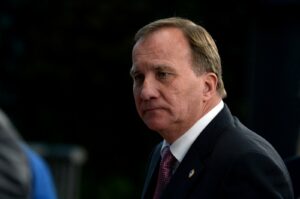Swedish Prime Minister Lofven announces plan to resign in November

Swedish Prime Minister Stefan Lofven plans to resign before the end of the year, after heading the Swedish government for the past seven years, he announced on Sunday.
Lofven declared his intention to step down as leader of the Swedish Social Democratic Party, as well as from his prime ministerial post at his party’s annual conference in November.
The decision to resign had been a long time coming, Lofven said during a speech in Akersberga near Stockholm, conceding that the party needed new leadership and some new energy, though the question of who will succeed him remains open.
“It’s not simple, but it’s the right thing to do. That’s what is most important,” he said during a Sunday press conference. Lena Radstrom, the party’s secretary general, said it was not possible to say often enough how important Lofven had been for the party and for Sweden.
Lofven’s successor will be decided at the Social Democrat party conference, scheduled to begin on November 3. The next parliamentary elections in Sweden are due in September 2022.
Finance Minister Magdalena Andersson is considered the favourite for the post. Multiple Swedish media outlets have referred to her as Lofven’s “crown princess.” Belonging to the party’s more conservative wing, she has multiple years of government experience.
The party’s nominating committee should meet in the coming days, according to a statement from the press conference.
Lofven, 64, has already resigned as prime minister once, as a result of a vote of no confidence in June.
He was subsequently renominated as prime minister and returned to his post after just a few days.
That political crisis was triggered by a dispute with the Left Party regarding rent controls for new buildings. As Lofven’s Red-Green coalition have only 116 of the 349 seats, a parliamentary majority of 175 votes can only be met with the help of the Left Party and the Centre Party, which prop up his minority government.
In recent years, it has become much more difficult to command a majority in the Swedish parliament. This leaves many governments on shaky ground.
A former union leader, Lofven first became prime minister in 2014. He returned to the job after elections in 2018, but only after months of coalition talks, sowing the seeds for the problems that hit him in June by creating a coalition of unlikely bedfellows.
The country’s next scheduled parliamentary elections are set for September 2022.
Source: GNA
